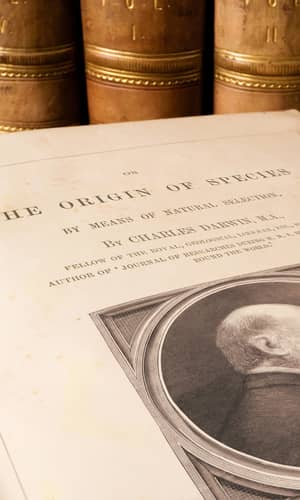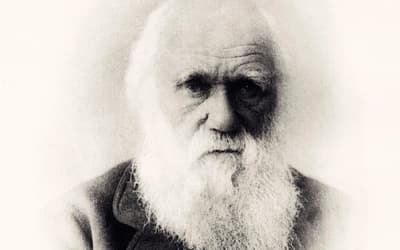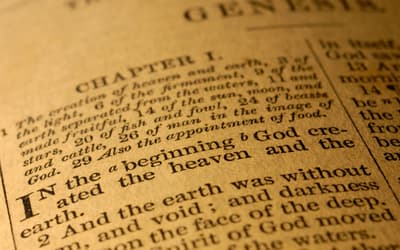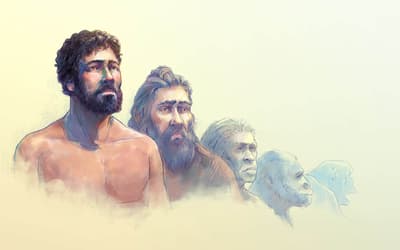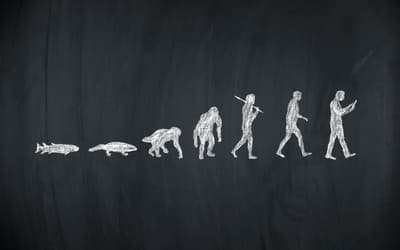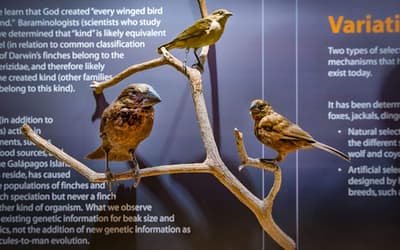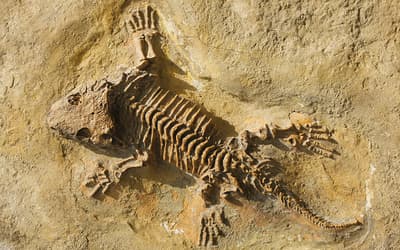The views expressed in this paper are those of the writer(s) and are not necessarily those of the ARJ Editor or Answers in Genesis.
Abstract
A common claim is that no conflict exists between modern neo-Darwinism and orthodox biblical Christianity. The conclusions of many of the most eminent biologists today and a major study of leading biologists were reviewed, finding that they strongly disagree with the non-conflict hypothesis.
Keywords: Darwinism, The Dover Court Case, atheism, influence of Darwinism on atheism, conflict of worldviews.
Introduction
U.S. District Judge Jones ruled in the 2005 Dover, Pennsylvania Intelligent Design court decision that no contradiction exists between modern Neo-Darwinism and theism. The judge ruled that:
Both Defendants [Dover Area School Board of Directors] and many of the leading proponents of ID make a bedrock assumption which is utterly false. Their presupposition is that evolutionary theory is antithetical to a belief in the existence of a supreme being and to religion in general. Repeatedly in this trial, Plaintiffs’ scientific experts testified that the theory of evolution represents good science, is overwhelmingly accepted by the scientific community, and that it in no way conflicts with, nor does it deny, the existence of a divine creator (Kitzmiller et al. 2005, p. 136).
Many, if not most, eminent biologists openly disagree with Judge Jones and have expressed this disagreement in the strongest terms possible. For example, University of Chicago biology Professor Jerry Coyne wrote that science has in the past delivered several crippling blows to humanity’s theistic worldview, and the most severe blow was
in 1859, when Charles Darwin published On the Origin of Species, demolishing, in 545 pages of closely reasoned prose, the comforting notion that we are unique among all species—the supreme object of God’s creation, and the only creature whose early travails could be cashed in for a comfortable afterlife . . . like all species, we are the result of a purely natural and material process (Coyne 2009, p. 34).
Coyne notes that the views of theologian John Haught, who testified in the Dover case, about the harmony of evolution and theism, have been soundly rejected by most scientists. Specifically Haught’s view was, although life may have evolved, the
process was really masterminded by God, whose ultimate goal was to evolve a species, our species, that is able to apprehend and therefore to admire its creator. This progressivist and purpose-driven view of evolution, rejected by most scientists, has been embraced by Haught and other theologians (Coyne 2009, p. 34).
In contrast to Haught, who also testified in the Dover trial that Darwinism and Christianity are fully compatible, the late Harvard Professor, Stephen Jay Gould, one of the most eminent evolutionary biologists of the last century, rejected the idea that the “improbability of our evolution indicates divine intent in our origin” (Gould 1991, p. 15). Rather, Gould noted, evolutionists have concluded that humans are “pitiful latecomers in the last microsecond of our planetary year” (Gould 1991, p. 18). Gould also wrote that no
scientific revolution can match Darwin’s discovery in degree of upset to our previous comforts and certainties. . . . Evolution substituted a naturalistic explanation of cold comfort for our former conviction that a benevolent deity fashioned us directly in his own image, to have dominion over the entire earth and all other creatures (Gould 2001, p. xi).
Gould concluded that humans are a “tiny and accidental evolutionary twig . . . a little mammalian afterthought with a curious evolutionary invention” called the human brain (Gould 1991, p. 13). Gould has made it clear elsewhere that Darwinism demands atheism, adding that
although organisms may be well designed, and ecosystems harmonious, these broader features of life arise only as consequences of the unconscious struggles of individual organisms for personal reproductive success, and not as direct results of any natural principle operating overtly for such “higher” goods . . . by taking the Darwinian “cold bath,” and staring a factual reality in the face, we can finally abandon the cardinal false hope of the ages—that factual nature can specify the meaning of our life by validating our inherent superiority, or by proving that evolution exists to generate us as the summit of life’s purpose (Gould 2001, p xiii).
Kansas State University Professor of Biology Scott Todd wrote that a stark contrast exists between the Darwinism and theism worldviews that Judge Jones ruled “in no way conflict” with each other, noting that the
crucial difference between what the creationists believe and what the proponents of evolutionary theory accept concerns the issue of whether the origins of life were driven by randomness or by an intelligent creator (Todd 1999, p. 423).
Design by an intelligent creator and the effects of randomness are diametrically opposed opposites, two ends of a dichotomy separated by a chasm. The fact is that
evolutionary theory weakened one of the most intuitively compelling arguments for the existence of God: the argument from design. Theists going back at least as far as Thomas Aquinas had argued that the intricate design found in organisms was evidence of a designer, namely God . . . neither Hume nor anyone else had been able to think of a better explanation, and the design argument retained much of its force. Darwin changed all of this. His theory of natural selection provided a naturalistic account of the origin of species—an explanation for design without a designer (Stewart-Williams 2004, p. 19).
Professor Nigel Williams was even more blunt, writing that Darwin “destroyed the strongest evidence left in the nineteenth century for the existence of a deity” (Williams 2008, p. R579). Professor Francisco Ayala explained in detail why Darwinism ruled out theism, namely that it negated the need for an intelligent creator because “Darwin’s greatest contribution to science” is that he led the way to prove that natural law can create all that is real, and no need exists for an intelligent creator because “organisms could now be explained . . . as the result of natural processes, without recourse to an Intelligent Designer” (Ayala 2007, p. 8567).
The Darwinian revolution resulted in a major rethinking of the nature of humans and human institutions. Oxford University Professor of the History of Science I. B. Cohen concluded that the
Darwinian revolution was probably the most significant revolution that has ever occurred in the sciences, because its effects and influences were significant in many different areas of thought and belief. The consequence of this revolution was a systematic rethinking of the nature of the world, of man, and of human institutions . . . This event, a declaration of revolution in a formal scientific publication, appears to be without parallel in the history of science (Cohen 1985, pp. 285, 299).
Scientists in Darwin’s day knew that this revolution was upon them. Botanist and phrenologist Hewett C. Watson wrote to Darwin on November 21, 1859, informing him that he (Darwin) was “the greatest Revolutionist in natural history of this century, if not of all centuries,” adding that a quarter of a century ago he and Darwin were two of the few persons who doubted special creation (Watson 1991, p. 385). Ernst Mayr concluded that Darwin “caused a greater upheaval in man’s thinking than any other scientific advance since the rebirth of science in the Renaissance” (Mayr 1976, p. 291).
The Most Significant Revolution in History
In the minds of many, if not most Darwinists, the Darwinian Revolution has resulted in explaining away the task that once required a creator and has replaced Him by blind, unintelligent and amoral natural laws. This is because
Darwin’s theory of natural selection accounts for the “design” of organisms, and for their wondrous diversity, as the result of natural processes, the gradual accumulation of spontaneously arisen variations (mutations) sorted out by natural selection. (Ayala 2007, p. 8567).
Ayala concluded, noting that
Mutation and selection have jointly driven the marvelous process [of evolution] that, starting from microscopic organisms, has yielded orchids, birds, and humans. The theory of evolution conveys chance and necessity, randomness and determinism . . . this was Darwin’s fundamental discovery, that there is a process that is creative, although not conscious (Ayala 2007, p. 8568).
The fact is, nowhere in Darwinism is there any mention or need for God, or even an Intelligent Creator, a fact which
raised an uncomfortable possibility: If God is not needed to explain the design in nature—which was generally considered the best evidence for a designer—maybe God does not exist at all (Stewart-Williams 2008, p. 19).
Darwin himself knew that his evolution theory not only supported atheism, but atheism was a logical result of his theory. Although Darwin personally
discouraged militant arguments against religion because they supposedly have little effect on the public, he nevertheless indirectly supported their use of his theory to propagate atheism (Caton 2008, p. 3).
An example is, in 1880 Darwin wrote a letter to atheist Edward Aveling that “it appears to me (whether rightly or wrongly) that direct arguments against christianity [sic] and theism produce hardly any effect on the public.” Darwin added that, instead of arguing directly against Christianity, the task of converting people to atheism
is best promoted by the gradual illumination of men’s minds, which follow from the advance of science [i.e. evolution]. It has, therefore, been always my object to avoid writing on religion [for publication, and for this reason] I have confined myself to science (Aveling 1883, pp. 4–5).
Darwin once said that he was with atheists “in thought” even though he preferred to call himself an agnostic as opposed to an atheist (Aveling 1883, p. 5). Ignored is the fact that, as noted in a review of Richard Dawkin’s book The God Delusion, Dawkins and other atheists usually totally ignore the faith-based nature of their own convictions:
As Dawkins acknowledges and physicists have shown, the existence of conscious, rational beings is a wildly improbable outcome. To insist that we are simply the products of the workings of, ultimately, physical laws is to avoid the question of the nature and origin of those laws. To say that there is no evidence for God is merely, therefore, an interpretation, justified in one context but quite meaningless in another. Everywhere we look, there is evidence of . . . something of a startling intelligibility (Appleyard 2007, p. 47).
University of Chicago Professor Jerry Coyne wrote that there exist
religious scientists and Darwinian churchgoers. But this does not mean that faith and science are compatible, except in the trivial sense that both attitudes can be simultaneously embraced by a single human mind. (It is like saying that marriage and adultery are compatible because some married people are adulterers.) (Coyne 2009, p. 33).
Cornell Professor William Provine wrote that the
implications of modern science produce much squirming among scientists, who claim a high degree of rationality. Some, along with many liberal theologians, suggest that God set up the universe in the beginning and/or works through the laws of nature. This silly way of trying to have one’s cake and eat it too amounts to deism. It is equivalent to the claim that science and religion are compatible if the religion is effectively indistinguishable from atheism. Show me a person who says that science and religion are compatible, and I will show you a person who (1) is an effective atheist, or (2) believes things demonstrably unscientific, or (3) asserts the existence of entities or processes for which no shred of evidence exists (Provine 1988, p. 10).
One study concluded that “science and religion have come into conflict repeatedly throughout history, and one simple reason for this is the two offer competing explanations for many of the same phenomena” (Preston and Epley 2009, p. 238). This study found from scientific research that increasing the values of one decreases the value of the other because the “two ideologies are inherently opposed, and that belief in one necessarily undermines belief in the other.”
The researchers concluded that, just as it is impossible to believe a single proposition can be both true and false at the same time, likewise one cannot logically and simultaneously believe in two contradictory explanations of life’s origins. Either God created life, thus creationism, or purely natural forces did, thus naturalistic evolutionism is true. The implications of this worldview are clear. In an essay based on the Phi Beta Kappa Oration given at Harvard University on June 3, 2008, Nobel Laureate Professor Steven Weinberg wrote that the
worldview of science is rather chilling. Not only do we not find any point to life laid out for us in nature, no objective basis for our moral principles, no correspondence between what we think is the moral law and the laws of nature . . . . the emotions that we most treasure, our love for our wives and husbands and children, are made possible by chemical processes in our brains that are what they are as a result of natural selection acting on chance mutations over millions of years. And yet we must not sink into nihilism or stifle our emotions. At our best we live on a knife-edge, between wishful thinking on one hand and, on the other, despair. Living without God isn’t easy. But its very difficulty offers one other consolation—that there is a certain honor, or perhaps just a grim satisfaction, in facing up to our condition without despair and without wishful thinking—with good humor, but without God (Weinberg 2008, p. 1).
This View in Science is Widespread
Surveys of eminent evolutionists find that most agree with those scientists quoted above. For example, Greg Graffin completed a Ph.D. in evolutionary biology at Cornell University under Professor William Provine. His thesis was on the religious beliefs of leading evolutionary biologists. The sample he polled consisted of 271 scientists, and close to 56% completed the entire questionnaire (151 persons). Graffin found that as a result of accepting the Darwinian worldview almost 98.7% of his respondents rejected a traditional theistic worldview and, instead, became functional atheists. He defined theism as a belief in a personal creative God as taught by the Christian, Jewish, and Muslim religions. He added that a San Antonio, Texas, attorney wrote recently to him asking
“Is there an intellectually honest Christian evolutionist position? . . . Or do we simply have to check our brains at the church house door?” The answer is, you indeed have to check your brains (Provine 1988, p. 10).
Over 84% of the scientists that returned the questionnaire rejected all theistic religions and most concluded that evolution serves as a replacement for theism. Almost none of the scientists in this pool of world-famous scientists even tried to marry Darwinism and theism, the two popular worldviews that Judge Jones ruled “in no way conflicts.” Graffin found that a rare few scientists attempted to harmonize Darwinism with theism, and an even rarer few tried to claim, as did one Ivy League paleontologist, that evolution is the fruit of “Gods love” (Graffin 2004, p. 78). Almost every scientist in his study recognized the unbridgeable gap between evolution and theism.
Both Graffin’s Cornell Ph.D. dissertation, and his book on the same topic, document in detail why orthodox Neo-Darwinism (a central tenet is Naturalism) and theism are at opposite ends of the spectrum. This is true not only for theism, but also of all major worldview questions, such as if an ultimate purpose exists in life and if we will be held accountable for our behavior in an afterlife or even if an afterlife exists. In Graffin’s words, “in most evolutionary biologists’ view, there is no conflict between evolution and religion on one important condition: that religion is essentially atheistic” (Graffin 2004, pp. 21–22). Graffin concluded that his study has documented that “naturalism is a young, new religion” that is now the dominant religion among almost all leading Darwinists (Graffin 2004, p. 38).
Most atheists and secular humanists recognize the fact that evolution commonly leads to atheism and they are, for this reason, at the forefront of defending evolution (Sharp and Bergman 2008). In a British article subtitled “Grayling dissects a new defense of Intelligent Design”, Grayling writes that science had proven molecules to man evolution is fact and, as a result, “the more science, the less religion. And this is a universal phenomenon (see the Pew polls on the decline of religion, even in the USA)” (Grayling 2008, pp. 27–29). It is for this reason that evolutionists fight so tenaciously to insure that dogmatic Darwinism is forced into the schools and that criticism of this view is, by law, censored.
Evolution Anti-Science
The chasm between evolution and theism is not the only concern of theists. Some theists object to what has now become dogmatic evolutionism for other reasons. Noble laureate Robert Laughlin concluded that evolution is actually anti-science. He wrote “of” or “about” his concern that much “present-day biological knowledge is ideological” which, he notes, involves explanations that have
no implications and cannot be tested. I call such logical dead ends antitheories because they have exactly the opposite effect of real theories: they stop thinking rather than stimulate it. Evolution by natural selection, for instance, which Charles Darwin originally conceived as a great theory, has lately come to function more as an antitheory, called upon to cover up embarrassing experimental shortcomings and legitimize findings that are at best questionable and at worst not even wrong. Your protein defies the laws of mass action? Evolution did it! Your complicated mess of chemical reactions turns into a chicken? Evolution! The human brain works on logical principles no computer can emulate? Evolution is the cause! . . . Biology has plenty of theories [to explain origins]. They are just not discussed—or scrutinized—in public (Laughlin 2005, pp. 168–169).
In other words, Laughlin notes that evolutionism has become an explanation for events for which no explanation as of yet exists. This implies that a valid scientific explanation does exist, which may discourage scientific investigation to find the real explanation.
Given the validity of the conclusions in this paper, Judge Jones’s ruling means that teaching a theistic worldview in state schools is illegal and only one worldview, Darwinism, can be taught. Professor Todd noted that
it should be made clear in the classroom that science, including evolution, has not disproved God’s existence because it cannot be allowed to consider it (Todd 1999, p. 423, emphasis added).
Professor Todd concluded that even if “all the data point to an intelligent designer, such an hypothesis is excluded from science because it is not naturalistic” (Todd, 1999, p. 423). Professors Cobb and Coyne wrote that
science is about finding material explanations of the world . . . Religion, on the other hand, is about humans thinking that awe, wonder and reverence are the clue to understanding a God-built Universe . . . There is a fundamental conflict here, one that can never be reconciled until all religions cease making claims about the nature of reality. The scientific study of religion is indeed full of big questions that need to be addressed, such as why belief in religion is negatively correlated with an acceptance of evolution (Cobb and Coyne 2008, p. 1049, emphasis added).
They concluded that efforts to bring religion and science into harmony will not bring science and religion (or “spirituality”) closer to one another nor bring about “advances in theological thinking” because the “only contribution that science can make to the ideas of religion is atheism” (Cobb and Coyne 2008, p. 1049). In 1929 Professor Watson wrote that evolution “is accepted by zoologists, not because it has been observed to occur or . . . is supported by logically coherent evidence to be true, but because the only alternative, special creation, is clearly incredible” (Watson 1929, pp. 231–233). The same is still true today. For example, Oxford Professor Richard Dawkins wrote that
instead of examining the evidence for and against rival theories [of the origins of life], I shall adapt a more armchair approach. My argument will be Why Orthodox Darwinism Demands Atheism 151 that Darwinism is the only known theory that is in principle capable of explaining [the origins of life] . . . even if there were no actual evidence in favor of the Darwinian theory . . . we should still be justified in preferring it over all rival theories (Dawkins 1986, p. 287).
Dawkins believes that there is evidence for Darwinism, but nonetheless admits his bias as did Watson. This is why Professor Laughlin has concluded that Darwinism is anti-science dogma. Professor Daniel Dennett concluded that Darwinism spelled the end of theism because Darwin’s idea of natural selection
is the best idea anybody ever had, ahead of Newton, ahead of Einstein. What it does is it promises to unite the two most disparate features of all of reality. On the one side, purposeless matter and motion, jostling particles; on the other side, meaning, purpose, design. Before Darwin these were completely separate realms (quoted in Ruvinsky 2010, p. 146).
Darwinism united the “most disparate features of all reality,” meaning that purpose and design, both of which can be explained by natural selection, negate the need for God.
This View Existed from the Beginning of Darwinism
Nagel wrote that from the start of the Darwinian revolution
it has been commonplace to present the theory of evolution by random mutation and natural selection as an alternative to intentional design as an explanation of the functional organization of living organisms. . . . Its defining element is the claim that all this happened as the result of the appearance of random and purposeless mutations in the genetic material followed by natural selection due to the resulting heritable variations in reproductive fitness. It displaces design by proposing an alternative (Nagel 2008, p. 188).
As noted above, Darwin himself made it very clear that his theory displaced God and he felt that an indirect approach was a more effective route to atheism. Darwin had murdered God, at least in the minds of many scientists. Cornell University biology professor William B. Provine made this very clear:
When Darwin deduced the theory of natural selection to explain the adaptations in which he had previously seen the handiwork of God, he knew that he was committing cultural murder. He understood immediately that if natural selection explained adaptations, and evolution by descent were true, then the argument from design was dead and all that went with it, namely the existence of a personal god, free will, life after death, immutable moral laws, and ultimate meaning in life. The immediate reactions to Darwin’s On the Origin of Species exhibit, in addition to favorable and admiring responses from a relatively few scientists, [was] an understandable fear and disgust that has never disappeared from Western culture (Provine 1994, p. 30).
So confident are Darwinists that evolution has destroyed theism that some scientists predict theistic religion will eventually die out as knowledge of evolution spreads. University of Pennsylvania professor Anthony Wallace wrote in 1966 that religion, under the assault of science, by which he means evolution, has been increasingly restricted in its influence, and he predicts that the
evolutionary future of religion is extinction. Belief in supernatural beings and in supernatural forces that affect nature without obeying nature’s laws will erode and become only an interesting historical memory. To be sure, this event is not likely to occur in the next generation; the process will likely take several hundred years . . . but as a cultural trait, belief in supernatural powers is doomed to die out, all over the world, as a result of the increasing adequacy and diffusion of scientific knowledge . . . the process is inevitable (Wallace 1966, pp. 264–265).
Why do many “scientists publicly deny the implications of modern science, and promulgate the compatibility of religion and science?” Provine answered as follows:
Wishful thinking, religious training, and intellectual dishonesty are all important factors. Perhaps the most important motivation in the United States, however, is fear about federal funding for science. Almost all members of Congress profess to being very religious. Will Congress continue to fund science that is inconsistent with religion? Scientists are trading intellectual honesty for political considerations (Provine 1988, p. 10).
Conclusions
It is clear that the most eminent life scientists of our age agree, and have expressed themselves in the strongest terms on the matter, that a clear, unbridgeable contradiction exists between Darwinism and theism. As Nick Lane of University College, London, wrote
Evolution has no foresight, and does not plan for the future. There is no inventor, no intelligent design . . . Design is all around us, the product of blind but ingenious processes. Evolutionists often talk informally of inventions, and there is no better word to convey the astonishing creativity of nature (Lane 2009, p. 5).
Claims such as Judge Jones’s that no contradiction exists between theism and Darwinism are not only naïve, but as documented above, are grossly uninformed. The common claim that no conflict exists between modern neo-Darwinism and orthodox biblical Christianity is contradicted by the conclusions of many of the most eminent biologists living today. Furthermore, a survey by Graffin of leading biologists found that they strongly disagree with the claim that evolutionism and Christian theism involving a personal God are compatible. Further, they can articulate valid reasons for their conclusion.
References
Appleyard, B. 2007. The delusion is all yours. New Scientist 193, issue 2593:47.
Ayala, F. J. 2007. Darwin’s greatest discovery: Design without designer. Proceedings of the National Academy of Sciences 104:8567–8573.
Aveling, E. B. 1883. The religious views of Charles Darwin. London: Freethought Publishing Company.
Caton, H. 2008. The Darwin legend. Queensland: Institute of Medical Research.
Cobb, M. and J. Coyne. 2008. Atheism could be science’s contribution to religion. Nature 454:1049.
Cohen, I. B. 1985. Revolution in science. Cambridge, Massachusetts: Harvard University Press.
Coyne, J. A. 2009. Creationism for liberals. The New Republic, August 12, pp. 34–43.
Dawkins, R. 1986. The blind watchmaker. New York: Norton.
Graffin, G. W. 2004. Evolution, monism, atheism, and the naturalist world-view. Ithaca, New York: Polypterus Press.
Grayling, A. C. 2008. Origin of the specious; A. C. Grayling dissects a new defense of Intelligent Design. New Humanists123, no. 5:27–30.
Gould, S. 1991. Bully for brontosaurus. New York: W.W. Norton
Gould, S. J. 2001. Introduction. Evolution: The triumph of an idea. by C. Zimmer, pp. ix–xiv. New York: Harper Collins.
Kitzmiller, et al. v. Dover Area School District, et al. Case No. 04cv2688, December 20, 2005. In the U.S. District Court for the Middle District of Pennsylvania.
Lane, N. 2009. Life ascending. New York, New York: W. W. Norton and Company.
Laughlin, R. B. 2005. A different universe. New York: Basic Books.
Mayr, E. 1976. Evolution and the diversity of life. Cambridge, Massachusetts: Harvard University Press.
Nagel, T. 2008. Public education and intelligent design. Philosophy & Public Affairs 36, no. 2:187–205.
Preston, J. and N. Epley. 2009. Science and God: An automatic opposition between ultimate explanations. Journal of Experimental Social Psychology 45:238–241.
Provine, W. 1988. Scientists, face it! Science and religion are incompatible. The Scientist 2, no. 16:10.
Provine, W. B. 1994. Dare a scientist believe in design. In Evidence of purpose: Scientists discover creativity, ed. J. M. Templeton, pp. 21–32. New York: Continuum.
Ruvinsky, A. 2010. Genetics and randomness. Boca Raton, Florida: CRC Press.
Sharp, D. and J. Bergman (eds). 2008. Persuaded by the evidence. Green Forest, Arkansas: Master Books.
Stewart-Williams, S. 2004. Can An evolutionist believe in God? Philosophy Now 47:19–21.
Todd, S. C. 1999. A view from Kansas on that evolution debate. Nature 401:423.
Watson, D. M. S. 1929. Adaptation. Nature 124:231–234.
Watson, H. C. 1991. Letter to Charles Darwin, November 21, 1859. In The correspondence of Charles Darwin, vol. 7: 1858–1859, eds. F. Burkhardt and S. Smith, p. 385. New York: Cambridge University Press.
Wallace, A. 1966. Religion: An anthropological view. New York: Random House.
Williams, N. 2008. Darwin celebrations begin. Current Biology 18, no. 14: R579–R580.
Weinberg, S. 2008. Without God. The New York Review of Books 55, no. 14.
